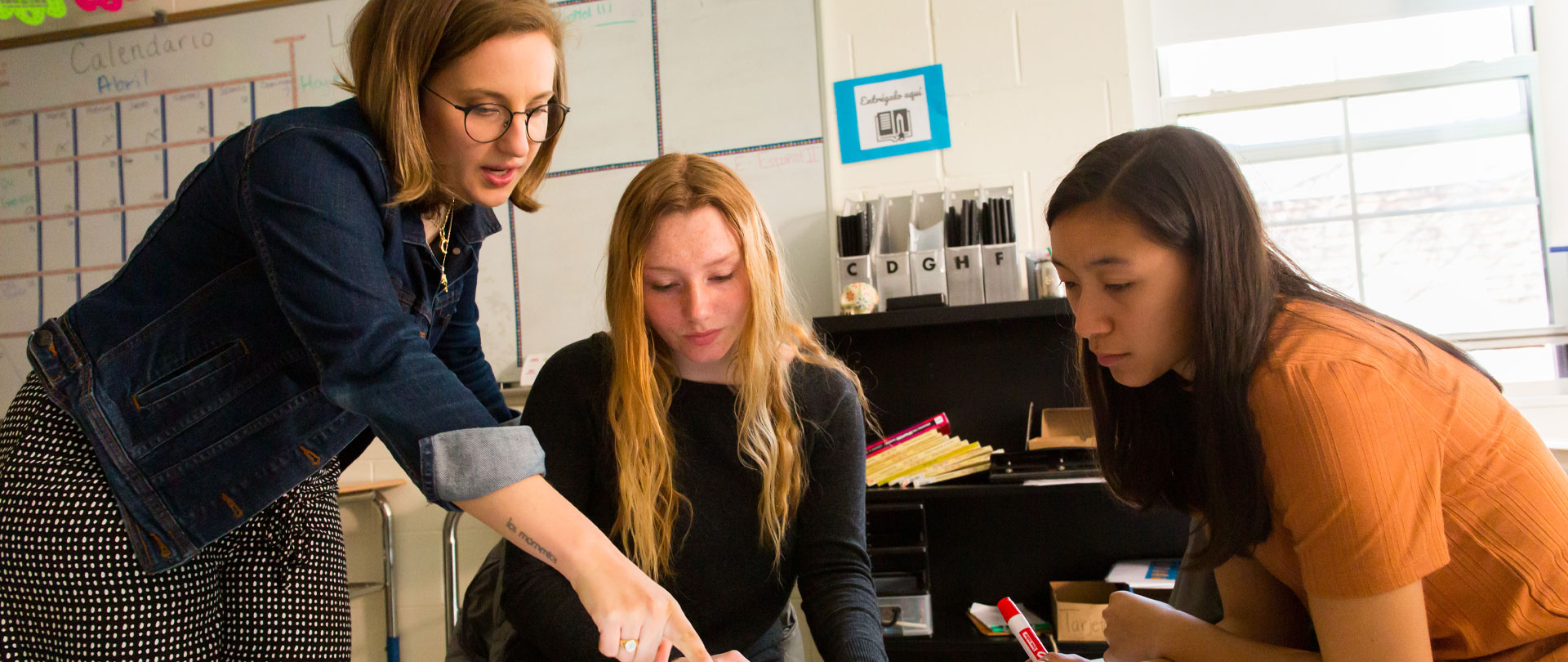Unique Learning Styles and Needs
Using an inclusive, co-teaching model, St. Andrew’s Learning Support Program supports students with mild/moderate learning differences including dyslexia, language-based learning disabilities, attention deficits, executive functioning challenges, and other learning differences, such as school-related anxiety.
Within co-taught classes, and utilizing additional support as needed, our teachers work with students to identify their strengths and demonstrate different pathways to success. Students learn to become effective self-advocates as they gain knowledge and understanding of their individual strengths, challenges, vulnerabilities and unique learning profiles. As a result, self-esteem and self-confidence grow.
Our Co-Teaching Model
Students enrolled in our Learning Support program take literature and mathematics courses that are co-taught by a content teacher and a learning support specialist. Within this model, students are able to access the same full International Baccalaureate program as their peers while also receiving the differentiated instruction and strategies they need to achieve content mastery. In addition, all Learning Support students are enrolled in Academic Workshop, a small group support class taught by a learning support specialist. In all of our classes, regardless of the subject, teachers utilize our St. Andrew's Universal Practices. Together, these components allow for the education of the whole child.
Academic Workshop
This course was developed for students with attentional and/or executive functioning difficulties. Students who take this course may need extra review of assignments; support to improve handing in assignments; encouragement and practice developing independent work completion habits; or time management in breaking down long term assignments. In addition, support may be needed with materials management, or organization to build efficiency in finding needed items. Still others may need support with planning ahead to build success, learning how to initiate a challenging task in a timely manner, knowing what to do when completing school tasks when they are home (or back to the dorm), and how to get started with their schoolwork.
The goal is not only to improve these executive skills and strategies, but also to reduce stress and increase academic success. In addition, because Academic Workshop is taught by teachers who are co-teaching in two of the students’ content classes, students learn preparation and study strategies specific to their courses.
Students in our Middle Years Programme attend Academic Workshop every day; students in our Diploma Programme attend every other day.
Additional Support Services
For students who need additional support beyond our main Learning Support program, we offer the following services for an additional fee beyond the base Learning Support tuition. In order to fit support services into a student’s schedule, they may take the place of another course, such as a foreign language.
Students diagnosed with a reading disorder or dyslexia may need tailored instruction to continue to develop decoding and encoding strategies. At St. Andrew’s, this is provided to students by reading specialists who use the Orton-Gillingham method or the Orton-Gillingam-aligned Wilson Program to teach and expand upon these skills. After assessment, an individualized teaching and tracking plan is created for each student.
Speech and language therapy is available for students who have documented needs (as presented in a formal, current evaluation obtained by the parent). Using curriculum- based materials whenever possible, support may be a combination of in-class support (in the Middle School), individualized therapy, and consultation with classroom teachers, all depending upon the needs of the student.
Students who struggle with social anxiety, social communication, or pragmatics may need a structured program to support them in the development of social interaction skills. At St. Andrew’s, we work with a speech and language therapist to collect assessment and evaluation data and determine a program of instruction for each student. Typically this initially takes the form of one-on-one instruction and coaching that is built into the student’s schedule.
At times, students and families may wish for more individualized support or instruction in a particular academic subject area or skill set. We offer a one-on-one tutorial option to support such needs.
International Baccalaureate and Learning Support
Learning Support students take the same IB courses as their peers. Inclusive by design, the IB approach values student diversity and respects individual learning differences.
In our Middle Years Programme (grades 6 through 10), our co-teaching model, small class size, Academic Workshop, and St. Andrew’s Universal Practices combine to offer each Learning Services student an academic program tailored to their individual learning profile.
In our Diploma Programme (grades 11 and 12), students continue to take Academic Workshop and receive supports as needed — and can choose between either Standard Level or Higher Level IB courses. Our Learning Support director, student advisors, and teachers work with each student enrolled in the Learning Support program to determine a course load that challenges them and enables them to reach their academic goals, while continuing to provide the additional academic support they need.
Is St. Andrew’s Learning Support the Right Fit for Your Student?
Although there is no “typical” Learning Support student, and all of our students are unique, most students share similar qualities in their learning profiles and their educational needs. Our students possess average to above average cognitive abilities and may or may not have a formal diagnosis. It is not uncommon, however, for students to have one or more learning vulnerabilities that interfere in the learning process. A small number of students identified as having an Autism Spectrum Disorder also attend St. Andrew’s.
Students who participate in our Learning Support Program may have one or more of the following diagnoses:
- Language-based learning differences including dyslexia
- Receptive and/or expressive language deficits
- Difficulty with executive functioning skills
- Memory storage or recall issues
- Auditory processing disorder
- Concurrent conditions such as ADD or ADHD that exacerbate a student’s learning challenge
- Non-verbal learning disorder
- Dysgraphia
- Social cognition challenges
- Processing issues that impact learning (e.g., memory, retrieval, graphomotor speed and production
St. Andrew’s School is not the right fit for every student. We are not a therapeutic school and our programs are not designed to meet the needs of children with primary behavioral or emotional difficulties.
Important Information
Assessment and Evaluation Information Needed for Candidate Application
As we strive to meet the individual needs of each potential student, candidates for the Learning Services program are evaluated based on their learning profile and the potential to thrive in our community. Current assessment information is key to understanding a student’s learning profile to determine programming and support needed in our learning environment. This information should include any group standardized testing a school district has completed. In addition, it is most helpful to have a current Psychoeducational Evaluation completed privately or through one’s school district. This includes both cognitive and educational achievement assessment information. The more current this information is, the easier it is to plan programming for the student. We also like to see the testing results from when the primary diagnosis was initially made.
For admission inquiries, please contact Assistant Director of Admission for Learning Support Samantha Kravitz at [email protected].
Learning Support Program Brochure







